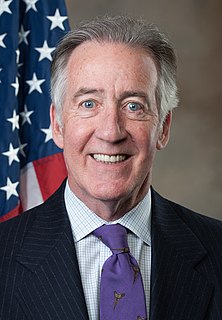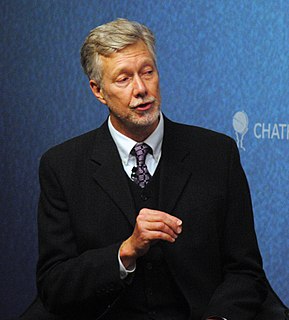A Quote by Thomas Pogge
The collective shortfall of the 3.08 billion people (47 percent of world population) who, in 2005, lived below $2.50 per day was $507 billion per annum, which indeed comes to about two-thirds of the present US military budget. This gives us a rough sense of how much the eradication of poverty would cost.
Related Quotes
I always give the analogy of the Earth at Night picture, of 7.3 billion of us, right? And everyone says, "Well, that's population." Well, if you took the entire world's population and you lived at the density of Manhattan proper - not a bad place to live - how much space do 7.3 billion people take up? The state of Colorado. At which point I end my lectures, because I want you to be thinking ... is this really a question of population, or is this a question of land use and resource consumption? And let's face it, the top 1.3 billion of us are doing all the damage. Sorry.
According to UNESCO: there are over 154 million children in the world deprived of education due to poverty, slavery, racism, religious extremism, gender discrimination, and geographical isolation. The cost to educate a child in the third world is about $ 1 per month per child. To achieve global literacy, the investment would be $ 8 billion per year for 15 years.
I think that humans are also set up to survive. We're not as small as rats, but we make up for that by being intelligent enough to make our own hiding places and to adapt to new habitats, even if they are changing very quickly. We have an enormous population, and can afford to lose billions of people without suffering very much as a species. Indeed, some would say losing five billion people would be good for the planet - I disagree with them, but can't deny that we would do just fine if there were two billion of us or even one billion.
In my first start-up, I had an initial advertising budget of $5 per day total. That would buy us 100 clicks per day. At $5 per day, marketing people scoffed and said that is too small to matter. But if you think about it, to an engineer, 100 real humans everyday giving your product a try means you can really start improving.
Yes, twenty-seven million in slavery is a lot of people, but it is just .0043 percent of the world's population. Yes, $23 billion a year in slave-made products as services is a lot of money but it is exactly what Americans spent on Valentine's Day in 2005. If humans trafficking generates $32 billion in profits annually, that is still a tiny drop in the ocean of the world economy.
How is it possible that a process can be democratic when it comes by way of money? If there is money then it can be elected a senator, it can be elected a representative. Do you know how much it cost to be elected president of the United States? The amount has reached, billions of dollars, 2 billion, 3 billion, 4 billion dollars, that's how much a presidential campaign costs. How much does a senatorial campaign cost? It costs 80 to 90 million dollars; or the campaign of a representative, 40 to 50 million. Is that really a democracy?
One of the great drivers of the alienation that has made Donald Trump possible is that the growth in the American economy has been weak. In the decade from 2005 to 2015, there was not one year when the US hit three per cent growth. And to the extent there's been growth, virtually all of it has been collected by the top 10 per cent of the population. Obviously, if we knew how to make growth faster, we would. We don't. And it's very difficult to make growth more broadly shared. Because it's not just the US that has this problem.
The UN special envoy on food called it a 'crime against humanity' to funnel 100 million tons of grain and corn to ethanol when almost a billion people are starving. So what kind of crime is animal agriculture, which uses 756 million tons of grain and corn per year, much more than enough to adequately feed the 1.4 billion human who are living in dire poverty?









































